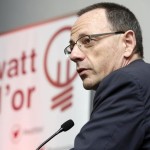ALTERED HABITATS
By Doug Struck | GLOBE CORRESPONDENT JULY 12, 2014
He was good, the head of Albert Einstein’s college said about the famous student. Very good; he changed the world. But it took a long time.
The lesson, says Lino Guzzella, president-elect of the renowned Swiss university known as ETH Zurich, is we cannot expect technological discoveries like those conceived by Einstein to save us from the pain of climate change.
“We cannot sit and fold our hands waiting for a new technology. If we have to wait until the next Einstein comes, it won’t do,” says Guzzella. “The problems we are talking about need to be tackled with the existing tools we have.”

ETH Zurich — Eidgenossische Technische Hochschule Zurich in German — is Europe’s MIT, a science and technology university ranked by some as the best on the European continent. Besides Einstein, the federal school has graduated 20 other Nobel prizewinners. Guzzella, an engineer specializing in energy systems, is accomplished in his own right, with a slew of honors for his accomplishments.
He was at Northeastern University on Friday with a delegation of about 70 Swiss to swap ideas with scholars and experts in Massachusetts on how to harness energy to meet the challenges of climate change.
The discussion swirled around the often-unspoken question that has offered hope to some about climate change and, arguably, inhibited action: will technology fix the problem? Even as an engineer, Guzzella does not believe in a magic technological bullet.
Despite “fabulous” developments in renewable energy technologies, “We cannot scale them up in a way that will sustain the status quo of today, and the bad machines of today,” he said of our energy-wasting infrastructure.
“Technology will bring us a long way. But we will need also a change in our lifestyle,” he said. “It’s a grim message, but a true message. Science and technology is useful, but if you want to save the earth, you need also to work on the other side, on reducing our energy use.”
Technology “buys us time and brings us a lot closer to the goal,” Guzzella said in an interview at Northeastern’s Egan Engineering Center. “But will it—how do you say it in American slang?—bring us the whole 90 yards? I don’t know.”
Einstein’s 1905 description of “the photo-electric effect” won him the Nobel Prize in Physics (not his now more-famous theory of relativity) and led to today’s photo-voltaic solar panels. It was “a breakthrough,” and “fundamental science is necessary for breakthroughs,” Guzzella said. “But it took many, many more years before we really developed photo-voltaic systems. The point is, we don’t have that time.”
The Swiss delegation, led by Doris Leuthard, who heads the Swiss ministry in charge of energy and environment, brought along descriptions of their “Gold watt” innovation awards, including a shower floor that reuses energy from the hot water, a nifty machine to clean trash from Alpine mountains, and a car that could travel across the United States on a quarter gallon of gas. The centerpiece of the exhibits, however—a model of “The Solar Impulse” aircraft that flew 26 hours without fuel — did not arrive on Friday. It was stuck in Customs.
Doug Struck has been a journalist for 35 years and reports on environmental matters from Boston. He can be reached at doug@dougstruck.com.